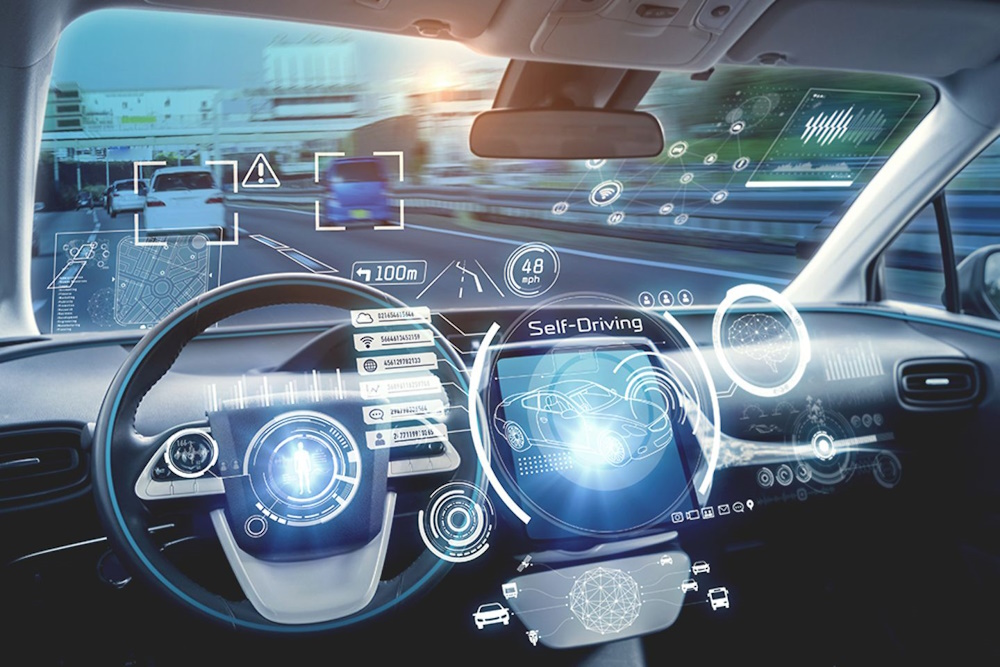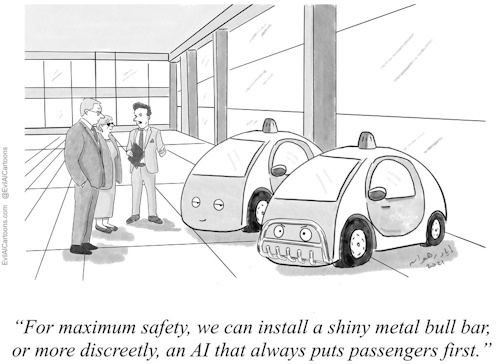 AI in Automotive
AI in Automotive
AI is enhancing safety, efficiency, and convenience in vehicle design, manufacturing, and operation
Related: AI Industry | AI Companies | AI Stocks
AI in the automotive industry refers to the application of advanced machine learning, deep learning, and computer vision technologies to improve various aspects of vehicle design, manufacturing, operation, and customer experience. By using AI algorithms and data analytics, automakers and tech companies are creating smarter, safer, and more efficient vehicles that can adapt to changing environments and user preferences. AI's role in automotive is not just about making cars smarter. but also about making the entire ecosystem around vehicles more efficient, safe, and user-friendly. As AI technology continues to advance, it promises to further transform the automotive industry, making vehicles safer, more efficient, and increasingly personalized to user preferences.

 Benefits of AI in Automotive
Benefits of AI in Automotive
- Improved fuel efficiency through optimized vehicle aerodynamics and engine efficiency
- Enhanced road safety with real-time hazard detection and automated driving maneuvers
- Faster transportation through AI-optimized routes and traffic flow monitoring
- Reduced manufacturing costs and increased productivity
- Predictive maintenance by continuously analyzing vehicle data
- Enhanced driver experience with infotainment systems and personalization
- Cost savings for manufacturers with robotics and other operational areas
- Targeted marketing strategies are possible with data analytics and AI-tailored campaigns
- Customer data platforms allow for the delivery of personalized experiences
 Key Areas where AI is being Used
Key Areas where AI is being Used
Safety Features
AI powers many of the advanced driver functions available on today's cars
Advanced Driver-Assistance Systems (ADAS) use AI for lane departure warnings, adaptive cruise control, blind-spot monitoring, and collision avoidance, providing timely alerts to drivers. It is projected that AI-powered automatic braking systems can reduce rear-end crashes by about 50%. Driver monitoring systems in today's cars can detect drowsiness, distraction, and impairment. These systems use AI to process data from cameras, lidar, radar, and other sensors to make real-time decisions.
Vehicle Design and Manufacturing
AI is used in vehicle design and in manufacturing automation
AI algorithms help in designing vehicles that are more aerodynamic, fuel-efficient, and safer by simulating thousands of design variations quickly. Generative AI creates hundreds of design variations for automotive parts.
AI-driven robotic assembly lines enhance automotive manufacturing processes, including welding, painting, and assembly, thereby increasing efficiency and precision. AI applications are also used for quality control, inspecting vehicles for defects during production, ensuring superior product quality and reducing error rates. AI enhances automation in production lines, improving precision, reducing waste, and increasing efficiency. Predictive maintenance powered by AI can foresee equipment failures and reduce downtime. AI-driven robotics and automation optimize production processes and quality control, and digital twins simulate vehicle performance, thereby reducing physical prototype testing.
Personalized Car Experience
AI provides personalized infotainment systems and real-time traffic updates
AI can tailor the driving experience to individual preferences, adjusting everything from seat and mirror positioning to climate control, entertainment, and navigation suggestions. Integration of AI-powered voice assistants (like those from Amazon, Google, or Apple) allows for hands-free operation of vehicle functions, enhancing safety and convenience. AI-powered voice recognition also enables passengers to control various vehicle functions through simple voice commands. These virtual assistants use speech recognition to offer voice-activated controls for navigation and entertainment. Porsche and some others are using AI-based recommendation systems that suggest vehicle configurations tailored to individual tastes and usages.
Other Areas where AI is Used
Autonomous Driving
Fully self-driving cars rely heavily on AI for perception, decision-making, path planning, and vehicle control. Companies like Tesla, Waymo, and others are pushing the boundaries of what vehicles can do without human intervention. AI lies at the heart of self-driving cars, which empowers these vehicles to perceive their environment, make informed decisions, and navigate roads with minimal or no human input.
Predictive Maintenance
AI analyzes sensor data to predict equipment failures and optimize maintenance schedules. AI can analyze the data to predict when parts might fail or need servicing, thereby preventing breakdowns and factoring in these lessons to adjust maintenance schedules.
Fleet Management
For commercial vehicles like those from Amazon, FedEx, and UPS, AI helps in route optimization, fuel management, and even driver behavior analysis to improve efficiency and safety.
Supply Chain Optimization
AI improves inventory management, logistics, and procurement processes. AI can also predict demand for various vehicle models, effecting production schedules. AI also aids in streamlining supply chains, ensuring efficient delivery of parts and components.
Dealership Services
Machine learning and AI-powered chatbots have introduced round-the-clock customer service, providing detailed information to potential buyers. By leveraging data analytics and machine learning, dealers can now predict customer preferences and tailor their marketing efforts accordingly. AI-powered tools analyze customer data, including past purchases and online behavior, to create highly targeted marketing campaigns. AI enables dealerships to optimize their inventory management based on predictive trends, ensuring they stock vehicles that meet current market demand.

 Challenges of AI in Automotive
Challenges of AI in Automotive
- Data Privacy: With vehicles collecting vast amounts of data, there's a real concern about privacy and security. AI systems need to be designed with adequate security measures to protect the consumer.
- Ethical Issues: The use of AI in vehicles brings up ethical questions around vehicle decision-making in critical situations.
- Regulatory Issues: There is a need for new or updated regulations, especially with self-driving cars on the road.
 Future Outlook
Future Outlook
From enhancing vehicle functionality and safety to revolutionizing manufacturing processes, AI is at the heart of the automotive industry's evolution, heralding a new era of innovation and growth.
The integration of AI is expected to deepen with advancements in connectivity (like 5G and beyond), leading to even smarter vehicles that can interact with each other and the infrastructure, paving the way for connected cars and smart cities. Vehicle-to-vehicle and vehicle-to-infrastruction communication systems are future possibilities.
Projections indicate that the AI automotive market will witness a compound annual growth rate of 55% from 2023 to 2033. This increase underscores the automotive industry's utilization of AI in automotive design, manufacturing, and operations.
The value of the autonomous vehicle segment is expected to increase to $30 billion by 2024, driven by advances in AI self-driving technology. The market share for autonomous vehicles is forecasted to expand by 11% by 2032, satisfying a growing consumer demand for self-driving vehicles.
 Links
Links
AI in the Automotive Industry: Transforming Cars and Transportation
fullpath.com/blog/the-impact-and-benefits-of-ai-in-the-automotive-industry
humaxa.com/ai-in-automotive-industry
netguru.com/blog/ai-in-automotive
builtin.com/artificial-intelligence/artificial-intelligence-automotive-industry
newsroom.arm.com/blog/how-ai-is-used-in-car
salesforce.com/automotive/artificial-intelligence/guide
ravin.ai/blog/the-rise-of-ai-in-vehicle-safety
allstarsit.com/blog/integrating-artificial-intelligence-into-car-safety-systems